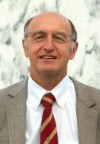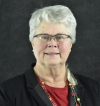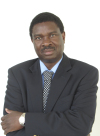AMES, Iowa – The world’s largest general scientific society is recognizing six Iowa State researchers for their “scientifically or socially distinguished” work in biological sciences, chemistry, engineering and agriculture.
The American Association for the Advancement of Science (AAAS) today announced this year’s class of 443 fellows, including these six from Iowa State:

William Beavis, professor and the G.F. Sprague Chair in Agronomy, “for distinguished contributions at the interfaces of the biological and mathematical disciplines, especially for the understanding and dissection of complex traits through genomic and information technologies.”
Beavis works at the intersection of biology and math and is often cited for his discovery of statistical bias in estimated genetic effects – the “Beavis Effect.” His current interest is to transform plant breeding from an agricultural art into an engineering discipline. He’s using applied mathematics to design efficient breeding systems for adapting and developing resilient crops for rapidly changing environments.

Andrew Hillier, professor and the Reginald R. Baxter Endowed Department Chair in Chemical and Biological Engineering, “for distinguished contributions to the fields of electrochemistry and electrochemical engineering, particularly the study of solid-liquid interfaces.”
Hillier’s current research focusses on the optical and electrochemical properties of thin films and coatings. The emphasis of his work is on nanostructured materials for sensors and optical elements, metal films and nanoparticle coatings for electrocatalytic applications such as fuel cells, and as model surfaces for understanding surface processes, including structure, stability, function and reactivity.

David Jiles, Anson Marston Distinguished Professor in Engineering, Palmer Professor in Electrical and Computer Engineering, the Stanley Chair in Interdisciplinary Engineering and a distinguished professor in materials science and engineering, “for distinguished contributions to the field of magnetism and magnetic materials, particularly for theory of ferromagnetic hysteresis and modeling of magnetic materials.”
Jiles’ research interests include the behavior of magnetic materials, including magnetoelasticity, magnetostriction, and magnetomechanical effects; development of novel magnetic materials; and applications of magnetic measurements to nondestructive evaluation and stimulation of the brain with magnetic fields for diagnostic and therapeutic purposes.

Alex King, professor of materials science and engineering, “for distinguished contributions to the science of interfaces and interfacial junctions in solids, and for implementing effective research approaches to the challenges of critical materials.”
King, the former director of the U.S. Department of Energy’s Ames Laboratory and founding director of the Critical Materials Institute operated by the laboratory, studies crystal defects and their interactions. He is currently writing a book on critical materials, focusing on the identification of research directions and policy options that can have meaningful impacts on supply chains.

Susan Lamont, Charles F. Curtiss Distinguished Professor in Agriculture and Life Sciences in the department of animal science, “for distinguished contributions to the fields of poultry genetics and poultry immunology, particularly the genetics of host immune response.”
Lamont studies the relationship of natural genetic variation in chickens with their ability to resist the negative impacts of stress and disease.

Wilson Rumbeiha, an affiliate of the College of Veterinary Medicine and former professor of veterinary diagnostic and production animal medicine, “for distinguished contributions to the field of toxicology, particularly for veterinary toxicology and diagnostic medicine.”
Rumbeiha, who recently moved to the University of California, Davis, has spent most of his career studying how poisons affect animals and using that knowledge to develop diagnostic testing procedures and drugs to treat and save animals. Rumbeiha – as part of “One Health” initiatives promoting the health of humans, animals and the environment – also studies the environment’s role in causing neurodegeneration in humans with the goal of preventing and/or developing countermeasures.
The AAAS will name this year’s class of fellows in the Nov. 29 issue of the journal Science. The association will also honor the new fellows during its annual meeting next February in Seattle.
AAAS was founded in 1848 and includes more than 250 affiliated societies and academies. It serves more than 10 million people and publishes the journal Science.
